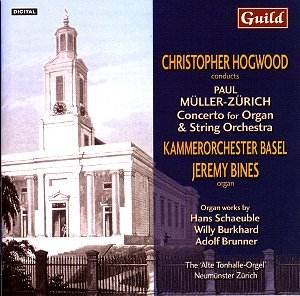Not surprisingly this music sounds much like
Frank Martin with some (non-humorous) echoes of Hindemith, and
generally approaches the overall quality of music by these composers.
The works are solo works, with the exception of the Müller-Zürich
Concerto, which very skilfully alternates the sonority of the
organ with that of the orchestra in a dialogue form with the two
protagonists trading off comments on the same material. Soloist,
conductor and orchestra work well together to produce a sprightly,
well phrased performance with a good sense of drama and motion,
skilfully displaying the variety of musical textures in the score.
The Preludium, Toccata and Sonatina
are interesting works, effective virtuoso showpieces for the soloist
and instrument. The most substantial solo work on the disk is
the chorale variations by Brunner. His intention was to produce
a work for performance in church on the Bach model and while hardly
comparable to Bach in either quality or style, it does effectively
project a sense of mystery and hidden energy.
The recording is of demonstration quality, so
this release will appeal especially to organ aficionados. The
organ was originally built in 1872 for the old Zürich Tonhalle.
In 1895 it was moved to the new Tonhalle, and then enlarged and
modernised in 1927. In 1985 the instrument was removed to make
way for a much larger instrument in the Tonhalle, and stored;
and in 1995 it was restored and reinstalled in the Zurich Neumünsterkirche
which provides a fine acoustical setting, as the recording testifies.
The keys are mechanical with electronic stop action. The organ
now boasts 52 ranks.
Organist Bines was born in Belfast in 1977 and
studied at Cambridge, getting a double starred First in organ
and then taking an additional degree in Ethnomusicology. At present
he is employed as repetiteur in various opera houses. Christopher
Hogwood has not usually been associated with music so new as this,
but is now well occupied with 20th century music recordings for
a number of labels conducting various orchestras on many continents,
as well as writing several books. Somehow he also finds the time
to teach at Cambridge, Harvard and the Royal Academy of Music.
Paul Shoemaker
